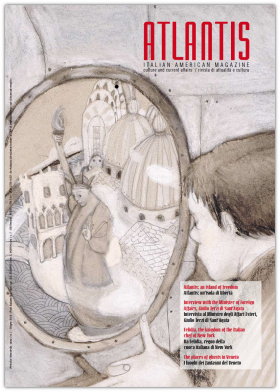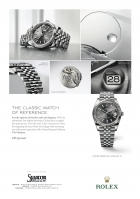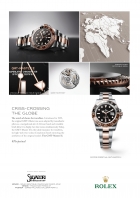ATLANTIS
International Affairs Magazine
Archive
June-July 2012

An island of freedom
Drawing its inspiration from the mythical lost continent that connected Europe to America, Atlantis is the new magazine that aims to be a cultural and political barycenter for the globalized world.
Atlantis is a legendary island quoted by Plato in his dialogues Timaeus and Critias, written in 360 BC. Atlantis (“Atlantide” in Italian) was a naval power “placed in front of the pillars of Hercules” (more or less in the middle of the Atlantic Ocean between Europe and America). Atlantis, according to the myth, conquered great part of Western Europe and of Africa, about 9.000 years before Solon. After a (failed) attempt to conquer Athens, “in one day and one night” the island disappeared into the water for good.
Atlantis is, therefore, a myth. And it is a myth that has been revived now and again in the intellectual and political imagination of the West. The one of Thomas More, writing in Latin in 1516, is an island called Utopia, which hosts an ideal society. “New Atlantis” was released in Latin in 1624 and three years later in English. The utopian tale by Francis Bacon describes the future of humankind in a crescendo of discoveries and knowledge that free humankind, leading it to absolute justice. The list could go on, but here is Atlantis magazine, which identifies in the fantastic and imaginary island in the middle of the Atlantic Ocean the cultural and political barycenter of this globalized world, where everyone has learned to produce and compete on the markets, but without gaining individual rights that are enough to define those men (and women) not only as producers but also as free men (and women). Atlantis lies halfway between Europe and America also to act as an ideal bridge and a tool for the comparison of development models, perhaps starting from the territory and the city in which it originates and is published, Venice. A city that for some centuries has been the most important publishing center of Europe, that is of the world. A city of water and commerce that has built and preserved its power and freedom during its years as a naval power, called to mercantilism, and finding in the sea and not in the mainland its true economical and political target. “Venice was a superpower whose behavior was in some way comparable to that of the giant of our times, the United States – journalist Alessandro Marzo Magno writes in his “L’alba dei libri” – Venetians for instance used to carry weapons with them more than other people and the republic was once one of the most important exporters of weapons. Venetian ships were sent into hot spots in the Mediterranean to show their flag and show that it was better not to face them. A sort of antecedent fleet in being that would characterize naval policies for centuries”. The central thread of Atlantis, therefore, is the Atlantic bond declined most of in the comparison between subjects that draw their inspiration from a socially flexible and mercantilist organization, that is a meritocratic one as opposed to a continental, state-centered, bureaucratic and socially stiff one. Water and the sea are the true global scene on which all the classic strategies have been played (today skies and space are important as well). In sum Venice has been for centuries a free center of cultural production, of exchange of goods and information, of finance, law and also, why not, of the shaping of trends: from cosmetics, to fashion, to gastronomy. Then the decline. Today the search for a new identity must pass from the comparison with those who are its ideal heirs in order to surpass it, at the same time keeping alive vivo its ideal spirit. This reality is across the ocean. To the West. From dialogue and comparison we will be able to be important in Europe, without being the subjects of Europe. From dialogue and comparison the awareness will originate of our own identities and our own vocation. Atlantis aims to be a bulwark, however light and entertaining its reading might be, of the freedom that unfortunately has sometimes been betrayed by such a recent, but old already, project of Europe. Enjoy your reading.




